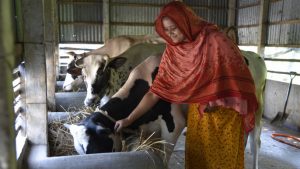The three partners working to eradicate Mycoplasma bovis (M. bovis) have reaffirmed their commitment to achieving eradication and support farmers through the eradication process.
The Ministry for Primary Industries, DairyNZ and Beef + Lamb New Zealand released the 2019 M. bovis National Plan at a meeting with farmers in Hamilton today.
The plan sets out three clear goals: to eradicate Mycoplasma bovis from New Zealand; to reduce the impact of the disease and the eradication programme for everyone affected; and to leave New Zealand’s biosecurity system stronger. M. bovis programme Director Geoff Gwyn said that the National Plan is an important step in making sure that eradication is successful, and that farmers are properly supported the whole way.
“The eradication effort is on track, but there is still a lot of hard work to get done. There will be more farms put under movement restrictions, and more farms that need to be depopulated,” says Gwyn.
“Finding out that your farm might be, or is, affected must be incredibly hard news to receive, and we know that the process to get clear of M. bovis causes hardship for farmers and their families, and interruption to their business.
“We want to provide as much support and assistance as we can, as well as working to continually improve the processes that farmers have to get through to get clear of M. bovis. “No country has attempted to eradicate M. bovis before, so there is a lot we are learning and developing as we go. The farmer and public meetings we’re holding over the next month are an important way for us to hear from farmers about what is working and areas that can be improved.”
DairyNZ’s Chief Executive Dr Tim Mackle says M. bovis has created challenges for many farmers, both dairy and beef – not only those affected by the disease, but for all farmers that have increased their biosecurity measures on farm.
“The alternative – to let this disease spread throughout the dairy and beef stock – would have been a serious challenge to the way we farm, and the ongoing costs would have been significantly higher” says Dr Mackle.
“We believe maintaining a collaborative approach to eradication is the best option for all farmers. By sitting at the table, we can ensure that dairy farmers are getting value for money from the eradication programme, costs are scrutinised, performance is monitored, and that dairy farmer’s views are represented to government.”
Beef + Lamb New Zealand Chief Executive Sam McIvor says: “Although we are fortunate that M. bovis has had a less direct impact on beef farmers, the risks to our friends and neighbours with dairy farms means Mycoplasma bovis is a challenge that we can’t ignore.
“We will continue to sit at the table with government and DairyNZ to ensure this eradication programme has the greatest chance of success, and that farmers are represented every step of the way.”
As part of the Programme’s commitment to continual improvement, it is updating how it reports the number of affected properties. From today we will report the total number of Confirmed Properties, Active Properties, and Cleared Properties, as we believe this is the most accurate and transparent way we can report on the scale of the Programme, and progress towards eradication. For more information on this change please visit the MPI website here.
Notes: The eradication of M. bovis is no longer a Biosecurity New Zealand response, but a national programme funded, resourced and governed by DairyNZ, Beef + Lamb New Zealand, and MPI.
The latest data on progress towards eradication is available in the weekly situation reports published on the Biosecurity New Zealand website. The 2019 National Plan is available on the Biosecurity New Zealand website.













